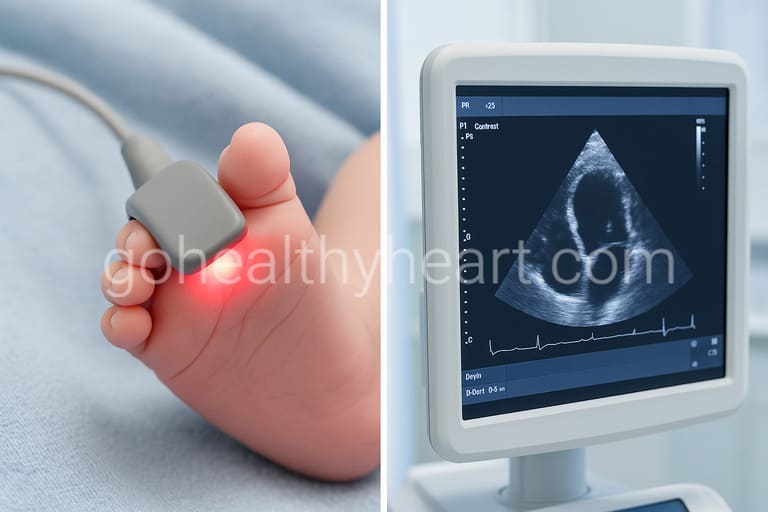Support for Parents of Babies with Heart Defects

As a parent, hearing that your baby has a heart defect is one of the most terrifying moments imaginable. You’re suddenly faced with countless questions, sleepless nights, and endless doctor’s appointments. Trust me, I’ve spoken to countless families in similar situations, and the emotional toll can be overwhelming. The good news is, you’re not alone. In fact, congenital heart defects (CHD) are one of the most common birth defects, affecting nearly 1 in 100 babies born. There’s a whole network to support parents of babies with heart defects out there, offering both emotional and practical guidance. In this article, we’ll walk through the different ways you can find that help, from understanding your baby’s condition to connecting with communities that truly get what you’re going through. Let’s explore how you can navigate this challenging journey.
Understanding the Diagnosis and What Comes Next
Getting the news that your baby has a heart defect can feel like the world’s crashing down around you. First thing’s first: take a breath. The initial shock is normal, but remember, many babies with CHD go on to live full, happy lives with proper care.
Common heart defects: Learn about the different types of congenital heart defects, like ventricular septal defect (VSD) and tetralogy of Fallot, so you can better understand what your baby is facing.
Medical jargon: Your healthcare team will throw a lot of terms at you—like “atrioventricular septal defect” or “ductus arteriosus.” Don’t hesitate to ask for plain explanations. You’re not expected to know everything!
Taking action: Second opinions are your right. If you feel unsure, seek another pediatric cardiologist. The clearer you are on the diagnosis, the better prepared you’ll feel moving forward.
Preparing for the long haul: CHD often requires a lifetime of care. Start learning now about long-term medical follow-up, surgeries, and treatments that may be part of your baby’s future.
Emotional Support for Parents of Babies with Heart Defects
When you first hear the diagnosis, it’s not just about the physical aspects of your baby’s condition—it’s about your mental and emotional health, too. You might feel fear, guilt, anger, and sadness all at once. Guess what? That’s completely normal.
The emotional rollercoaster: You’re allowed to grieve the loss of what you expected, even as you fight for your baby’s health. It’s okay to feel all the feelings. They don’t make you a bad parent.
Mental health resources: Therapy isn’t just for extreme situations. Many parents find counseling helps them process the overwhelming emotions that come with a CHD diagnosis. Some hospitals even offer free mental health support for parents with babies with heart defects as part of their neonatal care.
Connecting with other parents: Sometimes, the best comfort comes from those who’ve walked this road before you. Whether it’s through a Facebook group or a local CHD parent group, sharing your struggles and victories with others can be incredibly therapeutic.
Self-care tips: It’s easy to lose yourself in your baby’s care, but remember: you need to fill your own cup to pour into theirs. Whether it’s a short walk outside, reading a favorite book, or simply venting to a friend, find small ways to care for your mental health.
Practical Tips for Managing Your Baby’s Condition
Raising a baby with a heart defect involves a lot of day-to-day logistics, and the learning curve can feel steep at first. But there are ways to make it more manageable.
Medical records: Start a folder (physical or digital) where you store all medical records, doctor’s notes, and test results. This way, you’ll have everything at your fingertips for appointments and emergencies.
Appointment overload: Your baby will likely need regular check-ups with a pediatric cardiologist, along with other specialists. Create a shared calendar (or use a simple wall calendar) to keep track of upcoming visits.
Medication schedules: Depending on the type of CHD, your baby may require daily medication. Use apps or a pill organizer to ensure no doses are missed.
Feeding and post-surgery care: Babies with CHD often have unique feeding challenges. You might need to work with a nutritionist or use special feeding techniques. After surgeries, your healthcare team will provide detailed care instructions—follow them carefully, and don’t hesitate to ask questions.
Finding and Connecting with Support Networks
One of the most reassuring things you can do is build a network of support. You don’t have to go through this alone.
Support groups: There are numerous groups specifically for CHD parents. Whether online or in-person, these groups offer a space to share experiences, ask questions, and even vent when things get tough.
Peer support: Some hospitals have programs that pair you with another parent who has already walked this journey. It can be a huge comfort to talk to someone who truly understands the road ahead.
Social media: Online platforms like Facebook and Instagram have vibrant CHD communities. Just be mindful of misinformation—always cross-check medical advice with your healthcare provider.
CHD organizations: Groups like the Children’s Heart Foundation and the American Heart Association offer resources, advocacy, and even financial assistance to families affected by CHD.
Financial Support for Families with Babies with Heart Defects
The costs of treating CHD can add up quickly, and it’s common for parents to feel overwhelmed by medical bills. But there’s help out there.
Medical bills: Always check your insurance coverage thoroughly, and don’t be afraid to ask for itemized bills and second opinions on treatment costs. Hospitals often have financial counselors who can guide you through insurance claims.
Grants and charity support: Many organizations, such as the Children’s Heart Foundation, offer grants to help cover the costs of surgeries, medications, and other treatments.
Government assistance: Depending on your location, there may be state or federal programs designed to help with the financial burden of long-term medical care. In India, schemes like the Rashtriya Bal Swasthya Karyakram (RBSK) offer coverage for specific pediatric conditions, including CHD.
Conclusion:
Having a baby with a heart defect is no small feat. It requires emotional resilience, practical organization, and a strong support system. But remember, you’re not doing this alone. There are countless parents, doctors, organizations, and groups ready to support parents of babies with heart defects every step of the way. Take advantage of the resources available, stay informed, and most importantly, be kind to yourself. You’re doing an incredible job. Now, let’s take that next step—reach out to a support network or explore financial aid options. You and your baby deserve all the help you can get.




3 thoughts on “Support for Parents of Babies with Heart Defects”